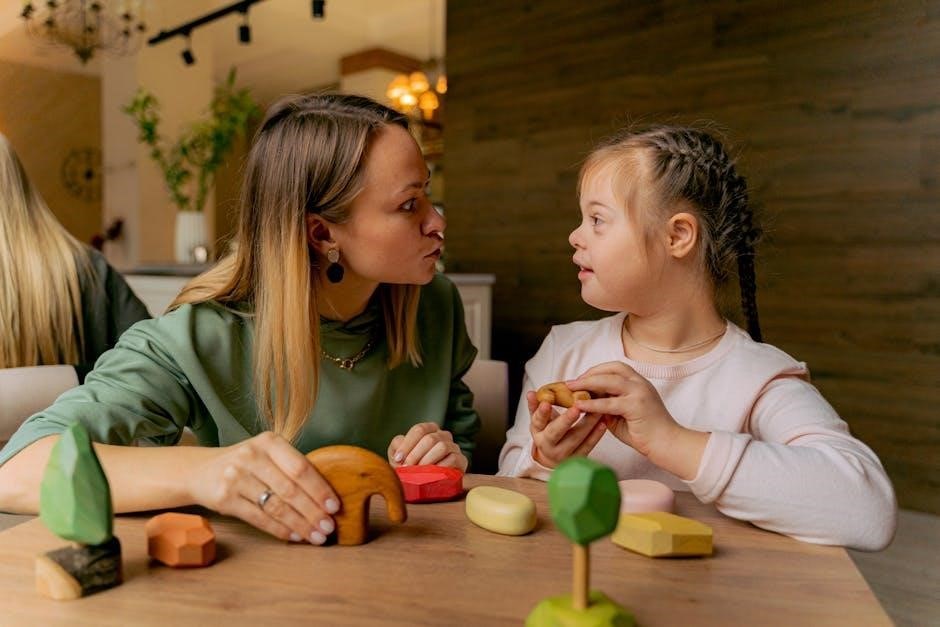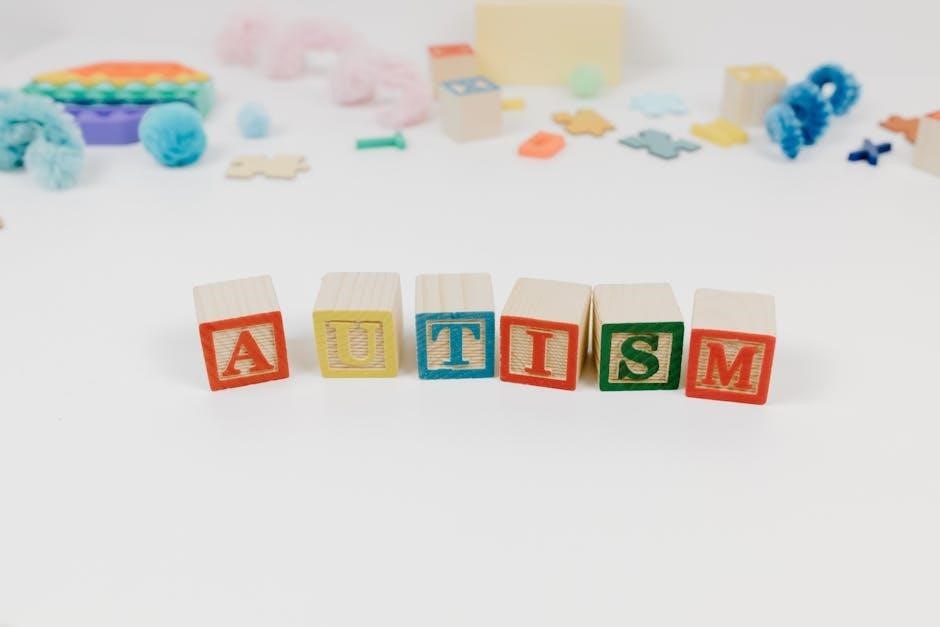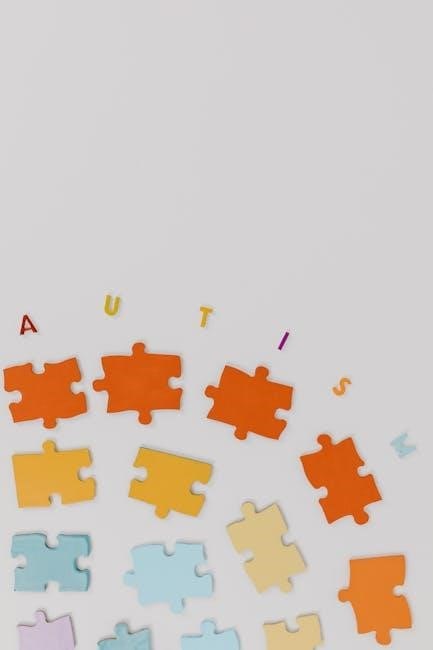Special instruction in early intervention is a tailored approach addressing developmental challenges in children aged birth to three, focusing on physical, cognitive, and communication skills through personalized strategies.
What is Special Instruction in Early Intervention?
Special instruction in early intervention is a service provided by trained professionals, such as developmental therapists or special instructors, to support children with developmental delays or disabilities. It focuses on helping children achieve skills in areas like physical development, cognition, communication, and social-emotional growth. This service is tailored to meet the unique needs of each child and is often delivered in collaboration with caregivers. Special instruction also addresses challenging behaviors by teaching positive strategies, ensuring children receive the support they need to thrive. It is a critical component of early intervention programs, aiming to foster inclusive and supportive learning environments for young children.
The Importance of Early Intervention for Children with Special Needs
Early intervention is crucial for children with special needs as it provides timely support during critical developmental periods. Research shows that intervening early can significantly improve outcomes, enhancing physical, cognitive, and communication skills. It addresses challenging behaviors, fostering a strong foundation for future learning and social interactions. Early intervention also empowers families, equipping them with strategies to support their child’s development. By reducing delays and promoting inclusion, early intervention sets the stage for lifelong benefits, ensuring children with special needs reach their full potential and lead fulfilling lives.

The Role of Special Instruction in Early Intervention
Special instruction in early intervention is a tailored approach provided by EI educators, focusing on personalized strategies to address developmental challenges and support children’s unique needs effectively.
Defining Special Instruction as a Service
Special instruction in early intervention is a goal-oriented service designed to support children with developmental delays or disabilities. It involves tailored strategies to address specific needs, ensuring activities are engaging and effective. Provided by trained educators, this service focuses on fostering skills across domains, such as cognitive, motor, and communication abilities. It is often delivered in natural settings, like homes or community locations, to promote learning in everyday contexts. The service is collaborative, involving families and other professionals to create a comprehensive support system. By addressing individual challenges early, special instruction aims to enhance children’s developmental trajectories and prepare them for future success.
The Role of Early Intervention Educators
Early intervention educators play a pivotal role in supporting children with special needs by designing and implementing tailored educational plans. They assess developmental levels, identify strengths, and address challenges to create individualized strategies. These professionals collaborate with families and multidisciplinary teams to align goals with the child’s daily routines and environments. Educators use evidence-based practices to foster skill development, incorporating play and interactive activities to engage children. They also empower caregivers by sharing techniques and resources, ensuring consistency in support. By addressing unique needs and promoting inclusion, early intervention educators help children build a strong foundation for lifelong learning and independence.

Benefits of Special Instruction in Early Intervention
Special instruction in early intervention enhances developmental progress, builds foundational skills, and addresses challenges early, reducing long-term difficulties and fostering independence in children with special needs.
Personalized Strategies for Developmental Challenges
Personalized strategies in special instruction address unique developmental challenges by tailoring interventions to a child’s specific needs. These strategies are designed to enhance skills like communication, motor abilities, and problem-solving. Early intervention professionals collaborate with families to create individualized plans, ensuring activities align with the child’s interests and strengths. Techniques may include adaptive tools, sensory integration, or behavioral supports. By focusing on personalized approaches, children receive targeted support, fostering independence and confidence. These strategies are regularly adjusted to reflect progress and evolving needs, ensuring a dynamic and effective intervention process that promotes overall developmental growth and prepares children for future success.
Addressing Physical, Cognitive, and Communication Skills
Special instruction in early intervention focuses on addressing physical, cognitive, and communication skills through tailored activities. Physical development is supported by exercises that improve coordination and mobility. Cognitive skills are enhanced through play-based learning, fostering problem-solving and memory abilities. Communication is strengthened via speech therapy, sign language, and assistive devices. These strategies are integrated into daily routines, ensuring a holistic approach to development. Early intervention helps children overcome delays and build foundational skills, reducing the risk of long-term challenges. By addressing these areas, special instruction equips children with the tools needed for lifelong learning, social interaction, and independence, laying a strong foundation for future growth and success.

Components of Special Instruction in Early Intervention
Special instruction includes developmental therapy, skill-building activities, and positive behavioral strategies. These components are tailored to meet individual needs, fostering growth in a structured, supportive environment.
Developmental Therapy and Skill Development
Developmental therapy focuses on enhancing children’s abilities to meet age-appropriate milestones through tailored activities. It addresses physical, emotional, and cognitive growth, ensuring each child progresses at their own pace. Skill development is embedded into daily routines, fostering independence and confidence. Therapists use evidence-based strategies to create engaging and effective interventions. This approach helps children build foundational skills, improving motor abilities, problem-solving, and social interactions. Personalized plans ensure therapies align with individual needs, promoting long-term developmental success and preparing children for future educational and life opportunities.
Positive Behavioral Strategies for Young Children
Positive behavioral strategies are essential in early intervention to encourage appropriate behaviors and reduce challenging ones. These strategies focus on creating supportive environments that foster social-emotional growth. Techniques like positive reinforcement, visual schedules, and redirection help children develop self-regulation skills. Collaborating with families ensures consistency in applying these methods at home. By addressing the root causes of behaviors, early interventionists can teach alternative, adaptive responses. These strategies not only improve behavior but also enhance children’s ability to engage in learning and build healthy relationships. Early implementation of these practices promotes long-term positive outcomes for children with special needs.

Delivery Methods of Special Instruction
Special instruction in early intervention is delivered through tailored approaches, including in-home services, center-based programs, and community-based settings. These methods ensure individualized support for each child’s needs.
Working with Caregivers to Achieve Developmental Milestones
Collaboration with caregivers is central to special instruction in early intervention. Professionals work closely with families to identify and support developmental goals tailored to the child’s unique needs. Caregivers are empowered to integrate therapeutic strategies into daily routines, fostering consistency and continuity. Training and guidance are provided to help caregivers implement interventions effectively. This partnership ensures that children receive support in natural settings, enhancing their ability to achieve milestones. By involving caregivers, early intervention promotes a child-centered approach, ensuring that interventions are meaningful and sustainable. This collaborative method strengthens the child’s progress and reinforces the caregiver’s role as a key contributor to their development.
Using Everyday Activities and Routines for Support
Special instruction in early intervention often incorporates everyday activities and routines to provide natural learning opportunities. Simple tasks like mealtime, bath time, or play can be adapted to support developmental goals. For example, using gestures during feeding can encourage communication, while structured play can enhance motor skills. Caregivers are shown how to embed therapeutic strategies into daily routines, making interventions seamless and effective. This approach ensures consistency and generalization of skills, as children learn in familiar environments. By leveraging ordinary activities, special instruction fosters meaningful progress without the need for separate therapy sessions, making it practical and sustainable for families.

Family Involvement in Special Instruction
Family involvement in special instruction fosters collaboration between educators and caregivers, promoting skill practice in home activities and empowering families to support their child’s development.
Empowering Families Through Early Intervention
Early intervention empowers families by equipping them with strategies and resources to support their child’s development. By involving caregivers in therapy sessions and goal-setting, families gain confidence in addressing their child’s unique needs. This collaborative approach ensures that interventions are tailored to the family’s lifestyle, fostering consistency and progress. Empowerment also comes through education, helping families understand their child’s strengths and challenges. This partnership not only enhances developmental outcomes but also strengthens the family’s ability to advocate for their child’s future needs, creating a lasting impact beyond the early intervention period.
Supporting Families in Addressing Challenging Behaviors
Early intervention plays a vital role in helping families manage challenging behaviors in children. Professionals work closely with caregivers to identify triggers and develop tailored strategies. Positive reinforcement and alternative behavior techniques are often emphasized. The focus is on creating a supportive home environment that encourages positive behavior. Families are equipped with tools to address tantrums, aggression, or other challenging actions. This support fosters consistency and helps children develop self-regulation skills. By addressing these behaviors early, early intervention sets the stage for long-term emotional and social growth, ensuring children thrive in various settings.

Eligibility and Access to Special Instruction
Eligibility for special instruction in early intervention is based on developmental delays or diagnosed conditions. Access is ensured through government-funded programs and public services.

Criteria for Early Intervention Services
Eligibility for early intervention services is determined by the presence of developmental delays or diagnosed conditions impacting a child’s growth. Assessments evaluate cognitive, motor, communication, and adaptive skills to identify delays.
Children under three years old with delays exceeding 25% in one or more areas qualify. Diagnosed disabilities, such as autism or cerebral palsy, also meet criteria. Evaluations are conducted by multidisciplinary teams to ensure accurate eligibility determination and personalized support planning.
Government-Funded Centers for Early Intervention
Government-funded centers for early intervention provide accessible services to children with special needs, ensuring equitable access to developmental support. These centers are supported by federal and state programs, such as the Individuals with Disabilities Education Act (IDEA) Part C, which mandates early intervention services for eligible children under three years old. Services include assessments, therapy, and family guidance, delivered by multidisciplinary teams. Centers often collaborate with local healthcare providers and schools to create a seamless support network. Funding ensures that low-income families can access these critical services, promoting early developmental progress and reducing long-term disparities in education and health outcomes for children with special needs.
- Supported by federal and state programs like IDEA Part C.
- Provide multidisciplinary services, including therapy and assessments.
- Focus on equitable access for all families, regardless of income.

Outcomes and Impact of Special Instruction
Special instruction in early intervention significantly enhances developmental progress, fostering skill acquisition, confidence, and long-term success for children with special needs, improving their overall quality of life.
Improving Developmental Outcomes for Children
Special instruction in early intervention plays a crucial role in enhancing developmental outcomes for children with special needs. By providing tailored strategies and therapies, it addresses delays in communication, social skills, and cognitive development. Early intervention fosters independence, emotional resilience, and academic readiness, setting a strong foundation for lifelong learning and growth. Research shows that children who receive these services often experience significant improvements in their ability to interact with peers, perform daily tasks, and achieve age-appropriate milestones. This targeted support not only boosts individual progress but also reduces the need for more intensive interventions later in life, promoting overall well-being and future success.
Addressing Socioeconomic Disparities in Early Intervention
Socioeconomic disparities often hinder access to early intervention services, disproportionately affecting children from low-income backgrounds. Special instruction in early intervention addresses these inequities by ensuring all children, regardless of economic status, receive the support they need. Government-funded programs and community partnerships play a vital role in reaching underserved populations. By tailoring services to meet diverse cultural and financial needs, early intervention helps bridge gaps in developmental opportunities. This equitable approach fosters more inclusive outcomes, enabling children from all backgrounds to thrive and reach their full potential, ultimately contributing to a more level playing field in early childhood development.

Future Directions in Special Instruction
Future directions in special instruction focus on advancing personalized learning, integrating technology, and expanding access to underserved populations. Innovations aim to enhance early intervention outcomes.
Advances in Neonatal Care and Early Diagnosis
Advances in neonatal care and early diagnosis are revolutionizing special instruction in early intervention. Improved prenatal and newborn screenings enable earlier identification of developmental delays and disabilities. Medical technologies, such as fetal MRI and genetic testing, provide insights into potential challenges, allowing for timely intervention. Enhanced neonatal care practices, like kangaroo mother care and targeted nutritional support, improve infant health outcomes. These advancements facilitate earlier referrals to early intervention services, ensuring children receive critical support during their most formative years. Collaboration between neonatologists and early intervention specialists promotes a seamless transition, equipping families with the tools needed to support their child’s development from the start.
Integrating Early Intervention with Special Education Services
Integrating early intervention with special education services ensures a seamless transition for children as they grow. This approach aligns the goals and strategies of early intervention with the frameworks of special education, creating a cohesive support system. Collaboration between early intervention providers and special education teams fosters a unified plan tailored to the child’s evolving needs. By bridging these services, children with diverse abilities receive consistent support, minimizing gaps in care. This integration also promotes long-term academic and developmental success, ensuring that children thrive as they progress through their educational journey with targeted, continuous support.
